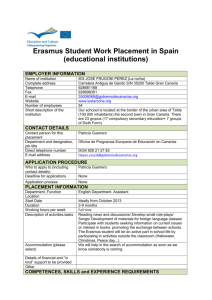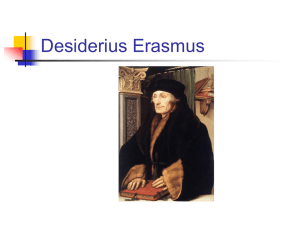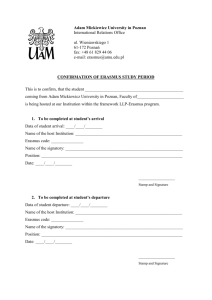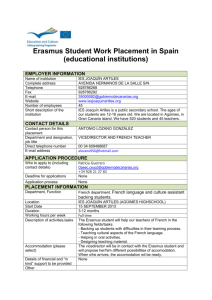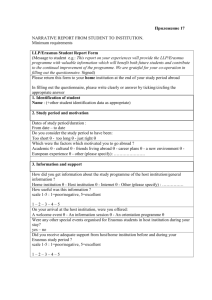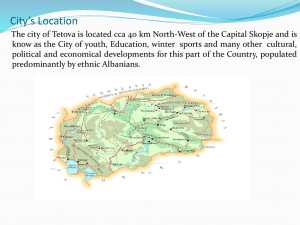LIFELONG LEARNING PROGRAMME
advertisement
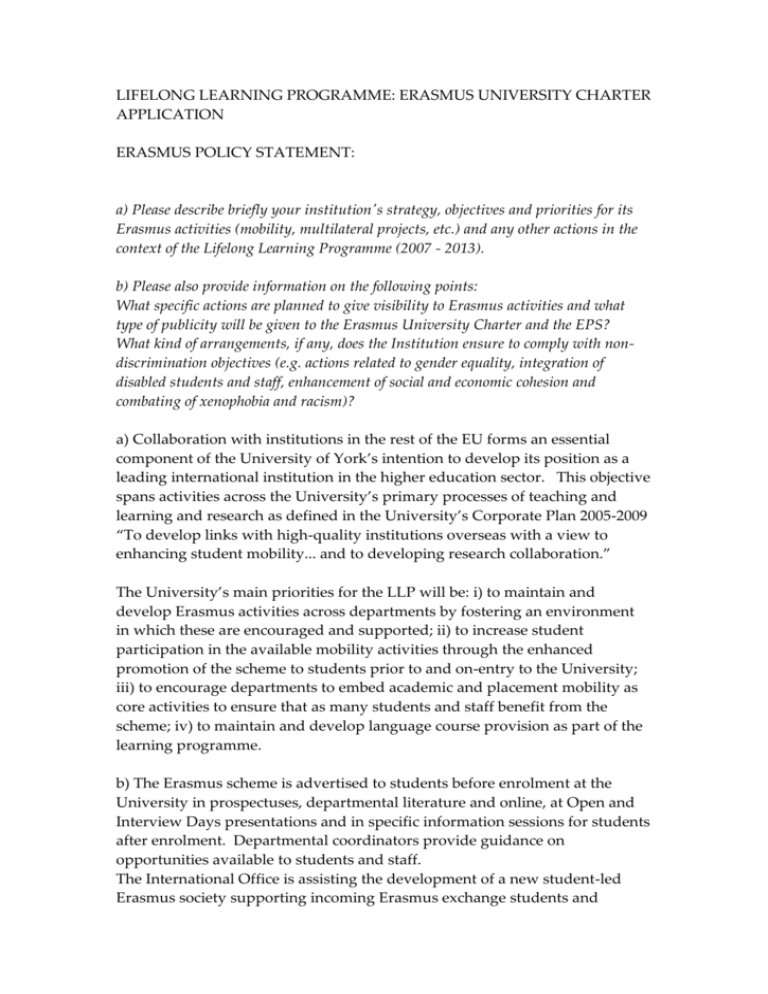
LIFELONG LEARNING PROGRAMME: ERASMUS UNIVERSITY CHARTER APPLICATION ERASMUS POLICY STATEMENT: a) Please describe briefly your institution's strategy, objectives and priorities for its Erasmus activities (mobility, multilateral projects, etc.) and any other actions in the context of the Lifelong Learning Programme (2007 - 2013). b) Please also provide information on the following points: What specific actions are planned to give visibility to Erasmus activities and what type of publicity will be given to the Erasmus University Charter and the EPS? What kind of arrangements, if any, does the Institution ensure to comply with nondiscrimination objectives (e.g. actions related to gender equality, integration of disabled students and staff, enhancement of social and economic cohesion and combating of xenophobia and racism)? a) Collaboration with institutions in the rest of the EU forms an essential component of the University of York’s intention to develop its position as a leading international institution in the higher education sector. This objective spans activities across the University’s primary processes of teaching and learning and research as defined in the University’s Corporate Plan 2005-2009 “To develop links with high-quality institutions overseas with a view to enhancing student mobility... and to developing research collaboration.” The University’s main priorities for the LLP will be: i) to maintain and develop Erasmus activities across departments by fostering an environment in which these are encouraged and supported; ii) to increase student participation in the available mobility activities through the enhanced promotion of the scheme to students prior to and on-entry to the University; iii) to encourage departments to embed academic and placement mobility as core activities to ensure that as many students and staff benefit from the scheme; iv) to maintain and develop language course provision as part of the learning programme. b) The Erasmus scheme is advertised to students before enrolment at the University in prospectuses, departmental literature and online, at Open and Interview Days presentations and in specific information sessions for students after enrolment. Departmental coordinators provide guidance on opportunities available to students and staff. The International Office is assisting the development of a new student-led Erasmus society supporting incoming Erasmus exchange students and providing a mechanism for returning students to share their experiences. The society also helps to promote the scheme to prospective and current students at University wide presentations and via informal social events. The EUC and the EPS are visible to all prospective and current students and staff online. In addition, the EUC is displayed on the Study Abroad notice board in the International Office. They are both advertised during presentations and are disseminated to departmental advisers. The EUC pocket card is given to each outgoing student in Erasmus contract packs. With regard to the programme's non-discrimination objectives, the University's commitment to Equal Opportunities is enshrined in its Corporate Plan for 2005-2009, which states one of our three core values to be: “to provide equal opportunities for all, regardless of gender, age, sexual orientation, physical ability, ethnicity, religion, culture or creed;" This commitment is promoted through policies such as Equality and Diversity Policy for Students; Equal Opportunities Employment Policy; Race Equality Policy and Action Plan and the Disability Equity Scheme (www.york.ac.uk/admin/eo/policies.htm). We have made extensive provision across campus to support staff and students including specifically trained advisers in this area. Quality of academic mobility activities: What kind of specific measures are implemented in the institution to ensure high quality in academic mobility activities? Details should be provided on: recognition and credit systems, the provision of information on curricula, information and counselling of outgoing students, tutoring and integration of incoming students, provision of student services (in particular accommodation), preparatory and refresher language courses, support and acknowledgement of staff mobility. The University Teaching Committee oversees the quality of programmes, approves all Erasmus agreements and ensures national and international quality requirements are addressed such as European Standards and Guidelines, and UK QAA Codes of Practice leading to the development of our policy statement on study abroad and placement learning. National professional bodies, such as the Royal Society of Chemistry and the Institute of Physics, provide additional assurance of quality through the accreditation of relevant degree programmes with a year in Europe. The University has a well-established and comprehensive network of services to support incoming and outgoing students. The International Office ensures that all exchange students receive the support and information they need on, for example, application procedures, available courses and credit transfer as well as pastoral matters. This is provided via email, web, direct contact, and by liaising with the departments both on an ad-hoc and formal basis. The office provides a formal orientation for each incoming cohort. Departments approve a learning agreement for each student and nominate a personal supervisor. An academic transcript is sent to the student's home institution as necessary detailing courses taken, credits and marks awarded. Departmental coordinators are responsible for assisting with applications, pre-departure briefings and the continued support of exchange students. ERASMUS students are guaranteed accommodation in one of the University’s eight colleges and become members of the Overseas Students Association and the ERASMUS society whilst the Language Teaching Centre provides language and study skills courses both before and during termtime. Teaching mobility is of personal benefit to participating staff and this is supported and acknowledged by the departments through experience sharing activities, during annual appraisals, and by providing additional funds or replacement teaching. Quality of student placement activities: What kind of specific measures are implemented to ensure high quality in student placements? Give details on how the work-programme and the placement agreements are prepared and implemented. Please describe the practical arrangements agreed between the parties. Please specify also the monitoring and evaluation of the placement(s) period as well as its recognition in the curriculum. The University of York encourages all departments to provide students with opportunities to undertake placements where relevant to an academic programme of study. The University endorses the QAA Code of Practice on Placement Learning and expects departments to ensure that all placement arrangements meet these requirements and draw on relevant good practice. Placements may be secured by two methods. Some are based on long-term established relationships with placement providers; others are instigated by the students themselves. Departments involved in Erasmus placements will use a standard 'partnership agreement' as a framework for shared responsibilities between the department, the placement provider and the student, naming supervisors at each end, identifying learning outcomes and assessment criteria and allocating credit. The student will receive a preliminary briefing, including health and safety issues, and a final debriefing. Placements are approved by the relevant department and by the University. Each department will identify placement coordinators who have a specific role to fulfil by assisting in the development of learning outcomes, giving predeparture advice, visiting students whilst on placement (where possible) and monitoring their progress. On-line resources to support students such as guidance notes, electronic message boards, University email / newsletters and weekly progress reports will provide two way communications during the placement. Where a placement forms an integral part of the programme of study at York, learning outcomes are detailed in the programme specification and documentation provided to students. Assessment varies according to the nature of the placement - some placements require on-site assessments, others require students to submit reports which are marked by York staff based on explicit criteria set out in the learning agreement.
